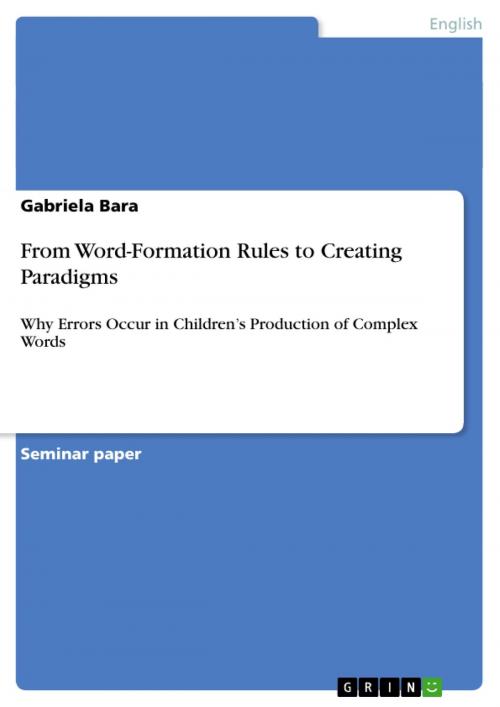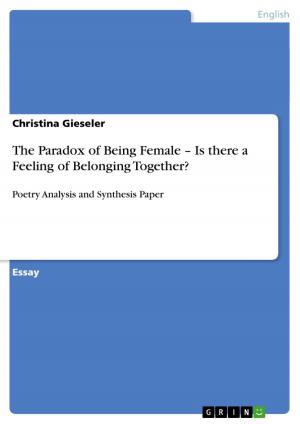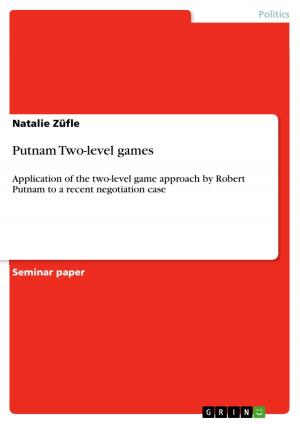From Word-Formation Rules to Creating Paradigms
Why Errors Occur in Children's Production of Complex Words
Nonfiction, Entertainment, Drama, Anthologies| Author: | Gabriela Bara | ISBN: | 9783640554362 |
| Publisher: | GRIN Publishing | Publication: | March 4, 2010 |
| Imprint: | GRIN Publishing | Language: | English |
| Author: | Gabriela Bara |
| ISBN: | 9783640554362 |
| Publisher: | GRIN Publishing |
| Publication: | March 4, 2010 |
| Imprint: | GRIN Publishing |
| Language: | English |
Seminar paper from the year 2007 in the subject English Language and Literature Studies - Linguistics, Technical University of Braunschweig (Englisches Seminar), course: Language Acquisition: Vocabulary and Modality, language: English, abstract: In the language acquisition process, children acquire words by simultaneously trying to comprehend how language functions and expressing forms which they have learned for meanings they wish to convey. Children are very skillful at identifying words in the stream of sounds, attributing meaning to them, segmenting them into smaller parts, and detecting rules of word structure. When they create words themselves, they use everything they have learned at different stages of acquisition, by following the rules they have discovered in language. As children learn more words, they are able to identify patterns and certain regularities in the lexicon. They make use of these patterns and build paradigms, i.e. they use the same templates to connect words which are related in form and meaning. By creating forms for specific meanings, they coin words which fit into an already existing paradigm. Paradigms reflect a certain regularity within language, and at the same time, reveal children's need to organize and compress the huge amount of words that they encounter. Despite children's skillfulness in learning language and their ability to analyze the structure of language and its regularities, despite their mastery in creating innovative complex words that follow principles of word-formation, not all the words children produce are legitimate forms. The purpose of this paper is to identify the reasons why errors occur in children's production of complex words. The second part of the paper will deal with a theoretical analysis of complex words, from the internal structure of words to main types of word-formation like derivation and compounding, and finally, will focus on establishing rules of word-building that children identify in language and also use in their word production. The following section will treat children's use of complex words, the word-formation processes they favor, the types of words they find easier to create, as well as the principles that they follow in their word creation. This part will close with a thematization of paradigms. The fourth part will analyze errors, and will concentrate on elucidating the purpose of this paper, namely, the question referring to the source of error production in children's creation of complex words. As will be revealed later in the paper, many of the illegitimate forms that children create are a result of non-permissible generalizations which reflect the regulating role of paradigms.
Seminar paper from the year 2007 in the subject English Language and Literature Studies - Linguistics, Technical University of Braunschweig (Englisches Seminar), course: Language Acquisition: Vocabulary and Modality, language: English, abstract: In the language acquisition process, children acquire words by simultaneously trying to comprehend how language functions and expressing forms which they have learned for meanings they wish to convey. Children are very skillful at identifying words in the stream of sounds, attributing meaning to them, segmenting them into smaller parts, and detecting rules of word structure. When they create words themselves, they use everything they have learned at different stages of acquisition, by following the rules they have discovered in language. As children learn more words, they are able to identify patterns and certain regularities in the lexicon. They make use of these patterns and build paradigms, i.e. they use the same templates to connect words which are related in form and meaning. By creating forms for specific meanings, they coin words which fit into an already existing paradigm. Paradigms reflect a certain regularity within language, and at the same time, reveal children's need to organize and compress the huge amount of words that they encounter. Despite children's skillfulness in learning language and their ability to analyze the structure of language and its regularities, despite their mastery in creating innovative complex words that follow principles of word-formation, not all the words children produce are legitimate forms. The purpose of this paper is to identify the reasons why errors occur in children's production of complex words. The second part of the paper will deal with a theoretical analysis of complex words, from the internal structure of words to main types of word-formation like derivation and compounding, and finally, will focus on establishing rules of word-building that children identify in language and also use in their word production. The following section will treat children's use of complex words, the word-formation processes they favor, the types of words they find easier to create, as well as the principles that they follow in their word creation. This part will close with a thematization of paradigms. The fourth part will analyze errors, and will concentrate on elucidating the purpose of this paper, namely, the question referring to the source of error production in children's creation of complex words. As will be revealed later in the paper, many of the illegitimate forms that children create are a result of non-permissible generalizations which reflect the regulating role of paradigms.















